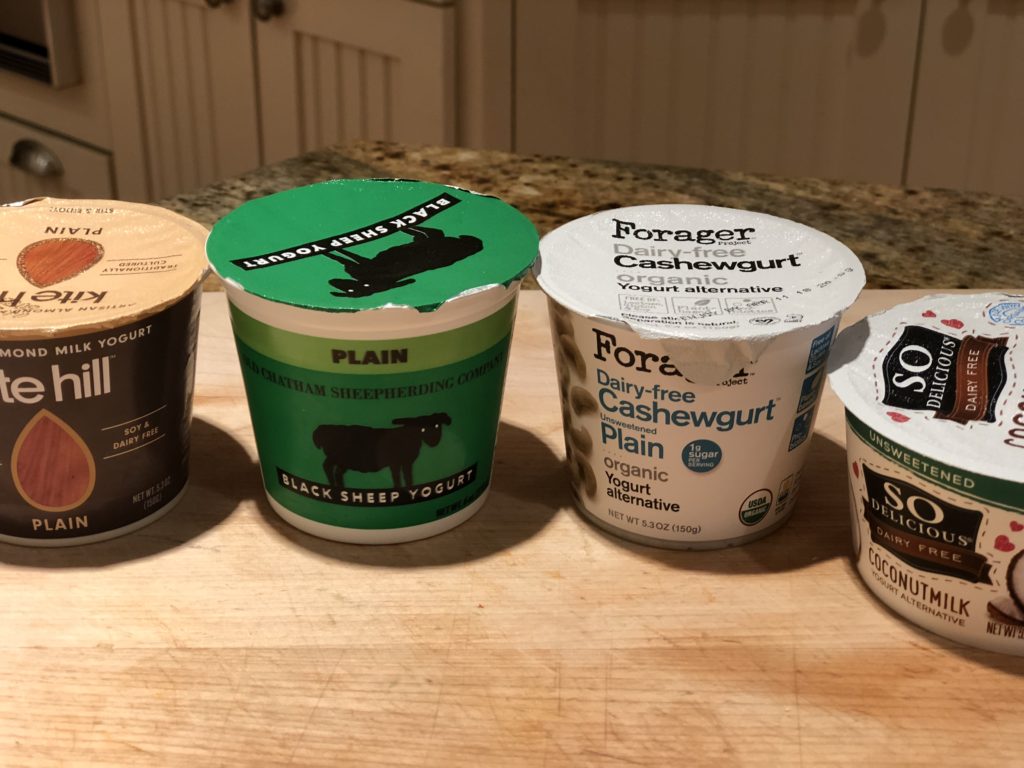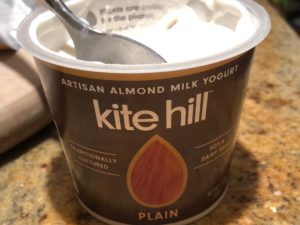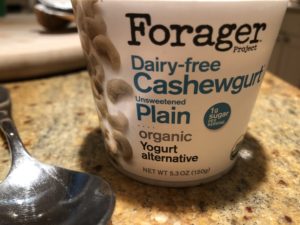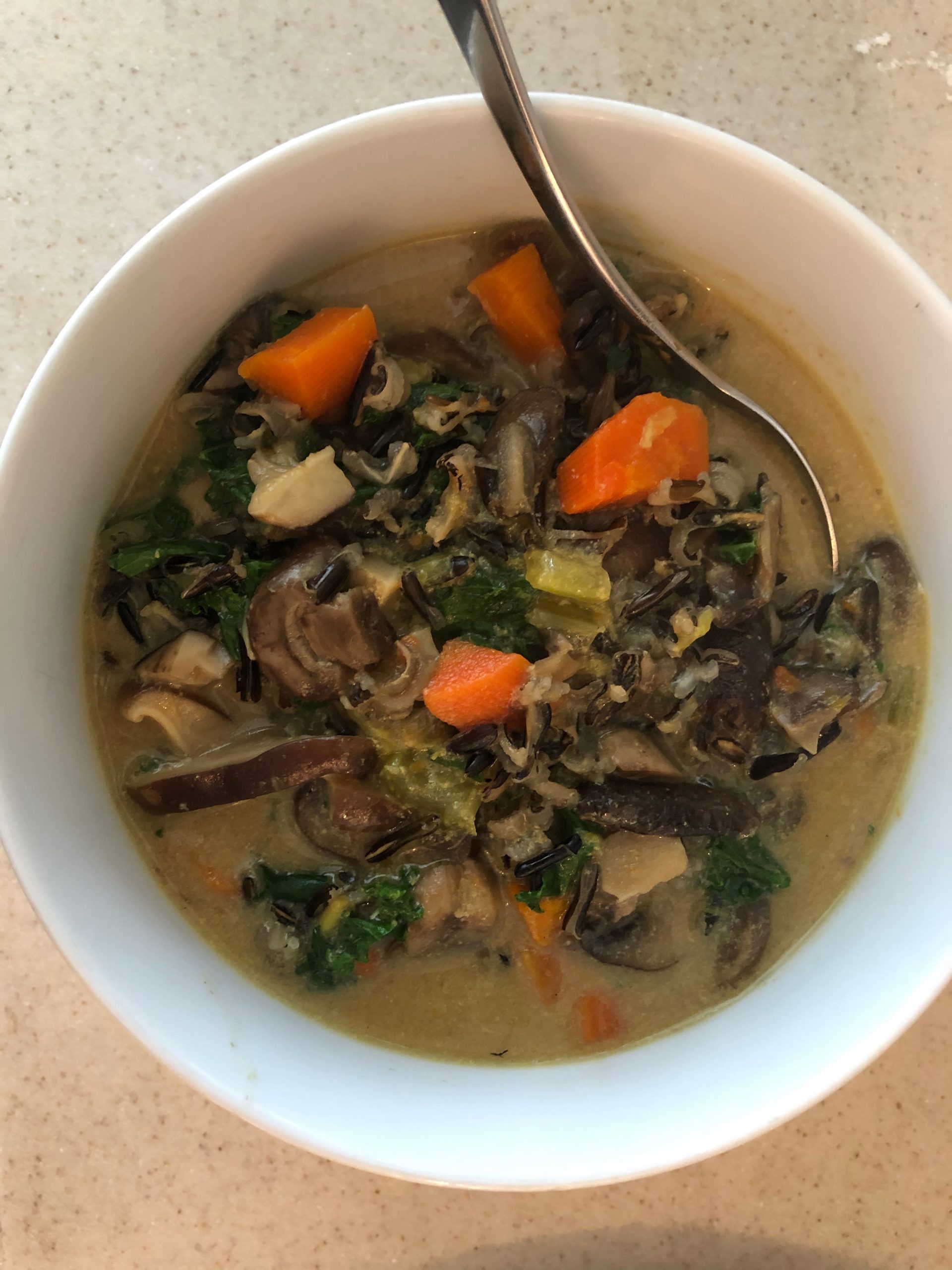Let’s talk yogurt, a good for you, “living” food. Traditional yogurt is made from milk and a variety of bacteria that not only helps thicken and give the milk its traditional sour taste but that are also beneficial for our intestines. They basically feed the good bugs already living in your gut.
This goes for other fermented foods such as sauerkraut, sourdough, kombucha and kimchi.

When I was growing up, yogurt went rogue by introducing soy yogurt, that chalky pasty stuff that you were supposed to eat if you were allergic/sensitive to dairy or if you were vegan. I choked many of those down, as that was the only option to the equally unpalatable “fat-free” yogurt of the 80’s.
Lately though, things are shaking up in yogurt land!
I did some heavy lifting for you and tried a variety of different yogurts that seem to reflect the trend towards plant-based alternatives and food sensitivities. I wanted to see if any matched up with real, whole milk yogurt. The protein, the calcium and the benefits needed for our guts.
Important note: I am talking about plain yogurt here, not fruit sweetened, or vanilla, maple or any other flavors – just plain. Flavors equal sugar, and more sugar is nothing we need in our daily diets. Adding a drizzle of local honey is always a great idea if you want your yogurt a tad sweet.
If you are sensitive/allergic to dairy, it’s nice knowing that there are alternatives. Let me start by saying that, like gluten-free baked goods, plant-based yogurts also need help and so you will find that, in addition to their basic ingredients, they include are a variety of gums, thickeners and stabilizers.
That was a red flag for me since I am not a fan of any ingredients in my food that might cause me stomach distress or other health issues. However, you probably unknowingly eat some of these additives every day in lots of foods like almond milk or bottled salad dressings without even realizing it.
My Yogurt Review
Almond Milk Yogurt by Kite Hill. Food companies like to use words such as “artisan” to make their products sound more upscale. Think again. Although the mouthfeel was thick and creamy, the taste was metallic, and I even had to look at the date to see if the yogurt had gone bad. It was musty tasting. Like old almonds that had been past due. Locust bean gum, xanthan gum and agar contribute to the thickness of this yogurt.

So Delicious Coconut Milk Yogurt. Not as thick and creamy as traditional yogurt, with a very strong coconut taste. I don’t mind the taste of unsweetened, plain dairy yogurt but the combination of coconut with a sour aftertaste was not appealing to me. Contains rice starch and locust bean gum to help thicken it.
Cashew Yogurt by Forager. A vegan staple, I actually use cashews all the time to make sweet or savory sauces and dessert or, “whipped cream” so I was pleasantly surprised with this yogurt. Rich and creamy, it is not white, like traditional yogurt, it has the color of cashews and a slight smoky aftertaste. It also does contain the thickeners cassava root and locust bean gum.
Goat Milk Yogurt by Black Sheep. If you can’t tolerate dairy, goat’s milk might be a good alternative for you. Another benefit to goat’s milk is the absence of stabilizers or thickeners. It is thick and creamy like dairy yogurt but be warned, this plain yogurt tastes just like goat cheese. After I took a bite I had to check the date – had it gone bad? No, it is just oddly high in sodium, 65 mg per container. I would liken this yogurt more for making a creamy dip rather than eating for breakfast or putting in a smoothie.
…and the winner is….
Cashew yogurt by Forager.
What is your experience with yogurt alternatives? Are there any that you love? Share in the comments below!





